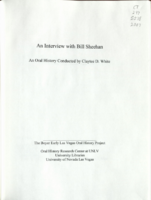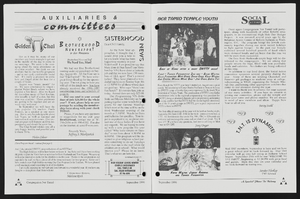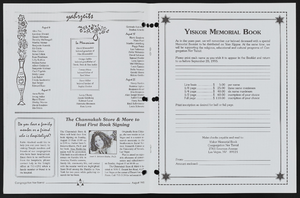Search the Special Collections and Archives Portal
Search Results

Interview with William Byron Beam, January 20, 2005
Date
Archival Collection
Description
Text

Interview with Lawrence Crooks, July 21, 2004
Date
Archival Collection
Description
Text

Transcript of interview with David Wasserman by Barbara Tabach, October 21, 2016
Date
Archival Collection
Description
For nearly two decades between 1950 and 1970, only one dentist of Jewish ancestry was known to be licensed to practice in Nevada. That was Dr. Joe Chenin. Finally, in 1971, the steadfast and easy mannered Dr. David R. Wasserman (1944 - ) broke through the barrier to become the second Jewish dentist serving the Las Vegas community. Over the following years, Dr. Wasserman built a sizeable following and immersed himself in the Jewish community of Las Vegas. Among his achievements is his participation and leadership in the formation of Las Vegas’ first Reform Jewish synagogue, Congregation Ner Tamid. He also would be active in the Jewish Federation. In 1992, as the HIV-AIDS epidemic affected dental offices throughout the nation, Dr. Wasserman saw an opportunity to get ahead of the infection. With the help of his wife Juanita Davis-Wasserman and his father-in-law Warren Davis, he developed, patented, manufactured and distributed a disposable tip for a treatment instrument commonly found in dental offices called a tri-syringe. This disposable tip brought sanitary options and great financial fortune to Dr. Wasserman and his family. In this oral history, Dr. Wasserman reflects on his joy of living in Las Vegas. He is a highly regarded dentist and leader in the Jewish community.
Text

Transcript of interview with Ron Lawrence by Dennis McBride, June, July and August 1997
Date
Archival Collection
Description
Ron Lawrence is one of the busiest people in the gay community, so I want him to know how much I appreciate his reserving time for me so that I could complete this oral history interview. The importance of his work toward the well-being of the gay community in Las Vegas cannot be measured, and much of what he's accomplished and otherwise made possible will live long after he leaves us. With Ron's consent to this interview, our knowledge of Nevada's gay history is greatly enriched and our record preserved.
Text

Transcript of interview with Walter Dane by Ann Clark, March 11, 1978
Date
Archival Collection
Description
On March 11, 1978, Ann K. Clark interviewed her step grandfather, tire repairman Walter Dane, (born August 10th, 1914 in West Barnett, Vermont) in her, the interviewer’s, home in North Las Vegas. Also present during the interview is the interviewer’s mother, Marie Dane. Walter relocated to Indian Springs in 1930 before settling in Las Vegas in 1943. In 1968 he moved to Utah, where he resided at the time of this interview. Well-traveled, Walter discusses his many moves over the years. Ultimately, this interview covers the growth and development of the Las Vegas and Indian Springs areas.
Text

Transcript of interview with Irene Doty by Jackie Ogden, March 20, 1977
Date
Archival Collection
Description
On March 20, 1977, Jackie Ogden interviewed Irene Doty (born 1914 in Dangerfield, Texas) about her life in Southern Nevada. Doty first talks about the first casino properties and restaurants in Las Vegas along with some of the other businesses and operations of the area. She also describes some of her experiences as a justice of the peace, conditions during World War II, and the clothing fashion of the time. Doty also talks about some of her experiences in Goodsprings, Nevada, and about her experiences as a juror and potential juror in several murder trials. The interview concludes with a discussion on housing development and gambling in Las Vegas.
Text

Transcript of interview with Gilbert D. Yarchever by Claytee White, 2006
Date
Archival Collection
Description
Gilbert Yarchever was one of nine siblings, born and bred in Pittsburgh, Pennsylvania. He describes the way his mother?s family was granted the last name of ?Kurfeersf" by Emperor Franz Joseph (of Austria-Hungary), explains the Seder (the Jewish observation of the exodus of Hebrews from Egypt), and tells what it was like to survive the Depression. Gilbert describes the jobs he held after high school and the government examination he took that led to his lifetime of adventure and travel. He moved to Washington, D.C., in 1940 and kept himself busy working for the government and taking classes at George Washington University, as well as working part time at Hecht Department Store and as a freelance court reporter. Following the attack on Pearl Harbor in 1941, Gilbert was sent to Africa on a merchant ship, helped smuggle Jewish survivors into Jerusalem, and was assigned the task of negotiating with Arab sheikhs for laborers to build a road. In the years after that, he worked in Europe, Panama, Alaska, Japan, and Hawaii and describes many of the jobs he was responsible for and many of the individuals he met. He also married and had children, kept up with university classes whenever he could, and collected art objects and paintings. Following his retirement in 1977, Gilbert and his family came to Las Vegas and bought a condo in Regency Towers. He did some consulting work for a couple of years, and then he and his wife began traveling around the states and going abroad. He was involved with UNLV?s EXCEL program, the music department, and the Las Vegas Art Museum. (He and his second wife Edythe presented the first major exhibition on Holocaust art at the museum.) These days Gilbert often donates pieces from his art collection to churches, synagogues, and charitable organizations.
Gilbert Yarchever was in the Navy during World War II, helped smuggle Jewish refugees into Jerusalem, worked as a civil servant in many countries, and moved to Las Vegas in 1977. He helped found the EXCEL program at University of Nevada, Las Vegas and was an art collector with his wife, Edythe Katz-Yarchever.
Text

Transcript of interview with Bill Sheehan by Claytee White, July 1, 2009
Date
Archival Collection
Description
Bill Sheehan describes his Philadelphia, PA, upbringing: Catholic schooling, importance of education and growing up with numbers (his father was a bookie). Knowing he might be drafted, he joined the Marine Corps in the 1940s and then returned home to finish he studies to become an accountant. In 1959 he became a Certified Public Accountant (CPA). A short term job in California gave him a taste of the west. It was 1962, Las Vegas was growing and experiencing a shortage of qualified accountants. Bill applied for a CPA position and immediately was hired. Thus, began his permanent residency in Las Vegas. Bill talks about his professional life and how he eventually started his own firm in 1971. He retired in 1997. He also shares personal anecdotes, impressions and observations specifically about the growth of Henderson, Nevada, as it grew from a very small town adjacent to Las Vegas into a small city of over 200,000 people. Bill is a co-trustee, with Bob Clark, of the Boyer Charitable Foundation. This interview and many more are possible through the generous donation of the Boyers.
Text


